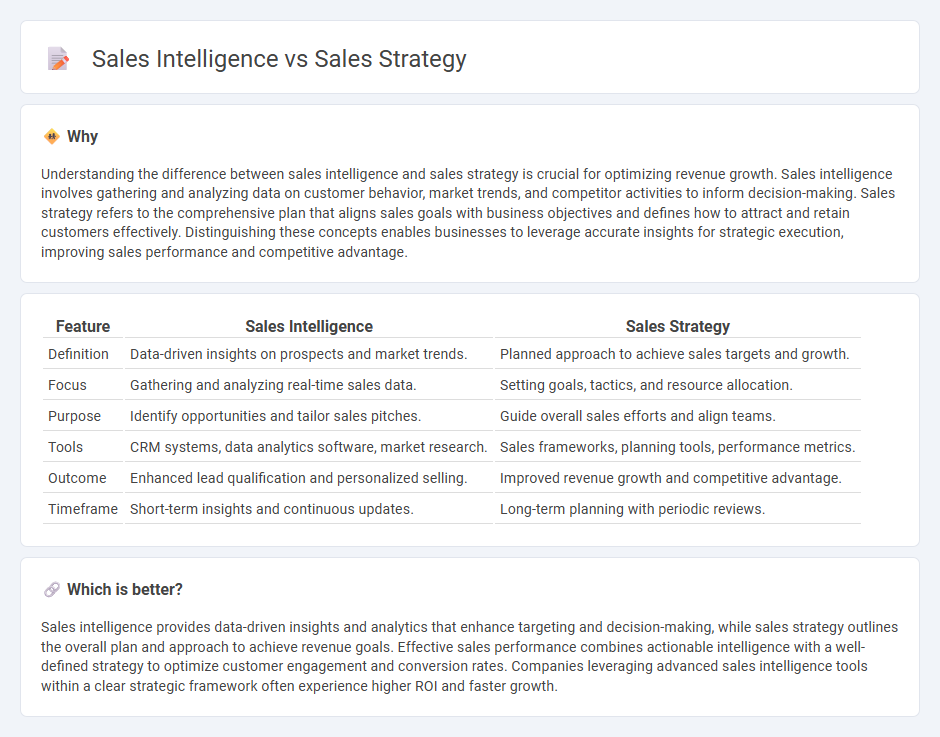
Sales intelligence involves collecting and analyzing data on customers, competitors, and market trends to make informed sales decisions, while sales strategy focuses on planning and executing methods to achieve sales targets and business growth. Integrating sales intelligence into sales strategy enhances targeting, personalization, and resource allocation for improved conversion rates and revenue. Explore detailed insights on how aligning sales intelligence with strategy can boost your sales performance.
Why it is important
Understanding the difference between sales intelligence and sales strategy is crucial for optimizing revenue growth. Sales intelligence involves gathering and analyzing data on customer behavior, market trends, and competitor activities to inform decision-making. Sales strategy refers to the comprehensive plan that aligns sales goals with business objectives and defines how to attract and retain customers effectively. Distinguishing these concepts enables businesses to leverage accurate insights for strategic execution, improving sales performance and competitive advantage.
Comparison Table
| Feature | Sales Intelligence | Sales Strategy |
|---|---|---|
| Definition | Data-driven insights on prospects and market trends. | Planned approach to achieve sales targets and growth. |
| Focus | Gathering and analyzing real-time sales data. | Setting goals, tactics, and resource allocation. |
| Purpose | Identify opportunities and tailor sales pitches. | Guide overall sales efforts and align teams. |
| Tools | CRM systems, data analytics software, market research. | Sales frameworks, planning tools, performance metrics. |
| Outcome | Enhanced lead qualification and personalized selling. | Improved revenue growth and competitive advantage. |
| Timeframe | Short-term insights and continuous updates. | Long-term planning with periodic reviews. |
Which is better?
Sales intelligence provides data-driven insights and analytics that enhance targeting and decision-making, while sales strategy outlines the overall plan and approach to achieve revenue goals. Effective sales performance combines actionable intelligence with a well-defined strategy to optimize customer engagement and conversion rates. Companies leveraging advanced sales intelligence tools within a clear strategic framework often experience higher ROI and faster growth.
Connection
Sales intelligence provides critical data insights on customer behavior, market trends, and competitor activities that inform the development of an effective sales strategy. Integrating sales intelligence enables sales teams to tailor their approaches, target high-value prospects, and optimize resource allocation for maximum revenue growth. A data-driven sales strategy powered by accurate intelligence improves forecasting accuracy, shortens sales cycles, and enhances overall performance.
Key Terms
Sales Strategy:
Sales strategy involves designing a comprehensive plan to target ideal customers, set pricing models, and allocate resources effectively to achieve revenue goals. It integrates market analysis, competitive positioning, and sales process optimization to drive growth and maximize profitability. Explore more insights on crafting impactful sales strategies today.
Target Market
Sales strategy involves defining and executing plans to reach specific target markets effectively, using segmentation, targeting, and positioning to maximize revenue potential. Sales intelligence leverages data analytics and market insights to identify customer needs, monitor competitor actions, and refine targeting accuracy within the chosen market segments. Discover how integrating these approaches can enhance your market focus and drive sales growth.
Value Proposition
Sales strategy centers on crafting a compelling value proposition that differentiates products and aligns with customer needs to drive revenue growth. Sales intelligence provides actionable data and insights on customer behavior, competitors, and market trends, enabling tailored value propositions and informed decision-making. Discover how integrating sales strategy with sales intelligence can maximize your value proposition's impact.
Source and External Links
8 Effective Sales Strategies, Examples, and Best Practices for ... - Clari - Define clear sales goals, research your target audience, analyze competitors, choose sales channels, set prices, craft a compelling sales message, select tools, train your team, decide on a sales methodology, and set a budget.
How to Develop a Winning Sales Strategy for 2025 - Atlassian - Establish SMART goals, create detailed ideal customer profiles, and continuously refine your approach based on customer insights.
22 Best Sales Strategies, Plans, & Initiatives for Success [Templates] - HubSpot - Set organizational and team goals, build tailored customer profiles, hire and compensate sales staff effectively, generate demand, measure performance, track activities, and leverage AI to enhance sales processes.
 dowidth.com
dowidth.com